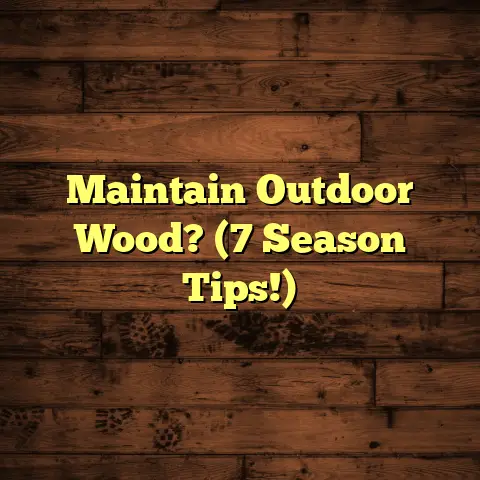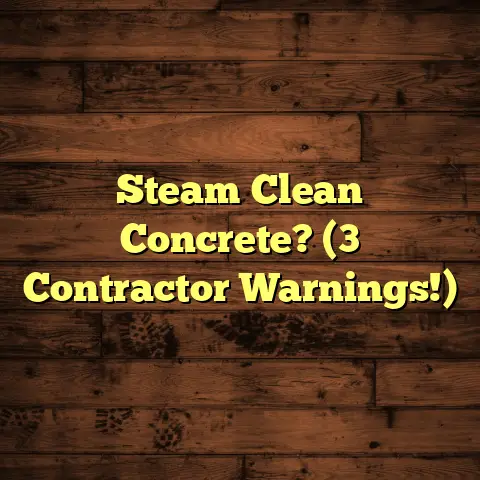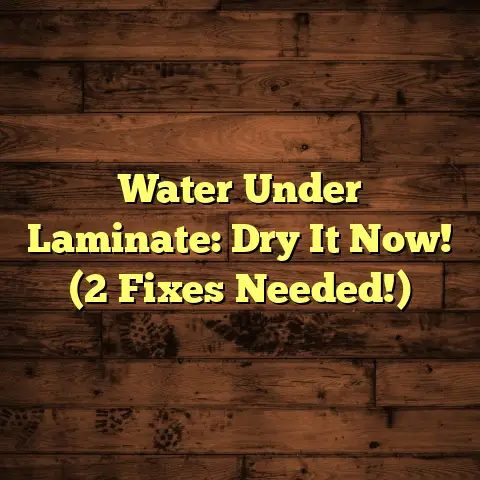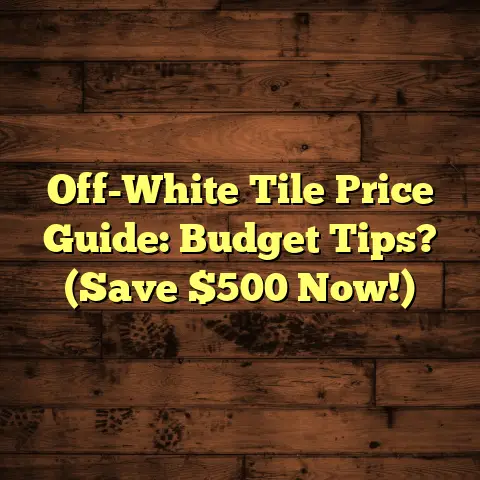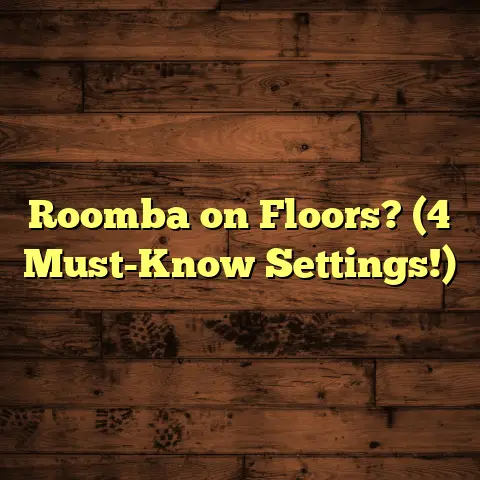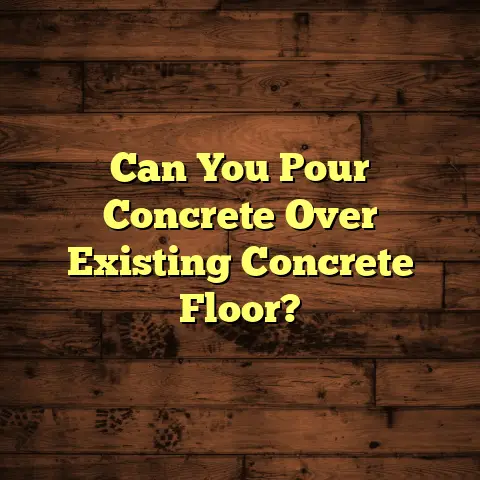Best Waterproof Vinyl Plank? (10 Top Picks!)
I’ve been installing floors for over 15 years, and I’ve seen it all – from disastrous floods ruining beautiful hardwood to happy homeowners enjoying worry-free, waterproof vinyl.
Let’s get one thing straight right away:
Many homeowners believe that all vinyl plank flooring is waterproof, but this is far from the truth.
I can’t tell you how many times I’ve had to explain this to folks who are surprised to find their “waterproof” floors buckling and warping after a minor spill.
The truth is, the level of water resistance can vary significantly.
It depends on the materials, construction, and the manufacturer’s promises.
This is why doing your research is super important!
This misconception can lead to poor purchasing decisions, especially for areas prone to moisture, like kitchens, bathrooms, and basements.
But don’t worry, I’m here to guide you through the maze of options and help you find the perfect waterproof vinyl plank for your needs.
In this article, I’m going to share my top 10 picks for waterproof vinyl plank flooring, based on my years of experience and countless installations.
I’ll also break down what makes a vinyl plank truly waterproof, what features to look for, and how to ensure your new floor lasts for years to come.
Ready to get started? Let’s jump in!
Section 1: Understanding Waterproof Vinyl Plank Flooring
So, what exactly is waterproof vinyl plank flooring?
And how is it different from other types of vinyl or laminate?
Let’s break it down.
Waterproof vinyl plank (WVP) is a type of flooring engineered to resist water damage completely.
Unlike traditional vinyl or laminate, which may offer some water resistance, WVP is designed to prevent water from penetrating the surface and damaging the core.
Think of it as a superhero for your floors, fighting off spills, splashes, and even minor floods!
But what makes it so special?
It all comes down to the materials and construction.
Materials Matter: What’s Inside Waterproof Vinyl?
Waterproof vinyl plank is typically made from several layers, each playing a crucial role in its performance:
- PVC Core: This is the heart of the plank, usually made of 100% virgin or recycled PVC.
This core is completely waterproof, preventing water from seeping through. - Backing Layer: This layer provides stability and support to the plank.
Some WVP options have an attached underlayment for added comfort and sound insulation. - Wear Layer: This is the top layer that protects the plank from scratches, dents, and wear.
The thickness of the wear layer is a key indicator of durability. - Decorative Layer: This layer gives the plank its realistic wood or tile appearance.
High-quality WVP uses advanced printing technology for a more authentic look.
Think of it like a layered cake, each layer working together to create a delicious and functional whole!
The Wear Layer: Your Floor’s First Line of Defense
Speaking of the wear layer, it’s worth emphasizing its importance.
The wear layer is measured in mils (thousandths of an inch), and the thicker the wear layer, the more durable the plank.
For residential use, I generally recommend a wear layer of at least 12 mils.
For high-traffic areas or commercial spaces, I suggest 20 mils or more.
Here’s a quick guide:
Core Technologies: Some brands use enhanced core technologies like Stone Plastic Composite (SPC) or Wood Plastic Composite (WPC).
SPC cores are denser and more rigid, providing superior dent resistance.
WPC cores are lighter and more comfortable underfoot.
Section 2: Key Features to Look For
Now that you understand what waterproof vinyl plank is made of, let’s talk about what to look for when shopping.
Not all WVP is created equal, and there are certain features that can make a big difference in performance and longevity.
Thickness, Density, and Texture: The Trifecta of Quality
- Thickness: While not directly related to waterproofness, the overall thickness of the plank can impact its stability and comfort.
I generally recommend planks that are at least 4mm thick. - Density: A denser core means a more durable plank that can withstand heavy foot traffic and resist dents.
SPC cores are generally denser than WPC cores. - Texture: The texture of the plank not only affects its appearance but also its slip resistance.
Look for planks with embossed textures that mimic the look and feel of real wood or tile.
Warranty: A Promise of Performance
The warranty is a crucial indicator of the manufacturer’s confidence in their product.
A longer warranty generally means a higher-quality plank.
Be sure to read the fine print and understand what the warranty covers.
Does it cover water damage?
Fading?
Wear and tear?
Knowing the details can save you headaches down the road.
Most good quality WVP comes with a warranty of 20-25 years.
Aesthetic Options: Style Without Sacrificing Performance
Just because you’re choosing a waterproof floor doesn’t mean you have to sacrifice style.
WVP comes in a wide range of colors, patterns, and finishes to suit any décor.
From realistic wood looks to modern tile designs, you can find a WVP that complements your personal style.
Don’t be afraid to ask for samples and see how they look in your space.
Lighting can dramatically affect the appearance of a floor, so it’s important to see it in your own home before making a decision.
Section 3: The Importance of Installation
You could buy the most expensive, high-quality waterproof vinyl plank on the market.
But if it’s not installed properly, it won’t perform as expected.
Proper installation is critical to ensuring the waterproofness and longevity of your new floor.
Installation Methods: Click-Lock, Glue-Down, Loose Lay
There are several different installation methods for WVP, each with its own pros and cons:
- Click-Lock: This is the most common method, where the planks interlock together like puzzle pieces.
It’s relatively easy to install and doesn’t require any glue. - Glue-Down: This method involves adhering the planks directly to the subfloor with adhesive.
It provides a more permanent and stable installation, but it’s more difficult to install and remove. - Loose Lay: This method involves simply laying the planks on the subfloor without any adhesive or interlocking.
It’s the easiest method to install, but it’s not as stable as click-lock or glue-down.
For waterproofing, click-lock is generally the best option, as it creates a tight seal between the planks.
However, it’s important to ensure that the subfloor is level and free of debris before installing.
Subfloor Preparation and Moisture Testing: The Foundation for Success
Before installing any type of flooring, it’s crucial to prepare the subfloor properly.
This includes:
- Cleaning: Removing any dirt, dust, or debris.
- Leveling: Filling any cracks or unevenness.
- Moisture Testing: Ensuring that the subfloor is dry enough for installation.
Moisture is the enemy of all types of flooring, even waterproof vinyl.
Excessive moisture can cause the planks to buckle, warp, or even develop mold.
I always recommend performing a moisture test before installing WVP, especially in basements or areas prone to moisture.
A simple calcium chloride test can tell you the moisture content of your subfloor.
Section 4: Top 10 Picks for Waterproof Vinyl Plank Flooring
Alright, let’s get to the good stuff!
Based on my experience and research, here are my top 10 picks for waterproof vinyl plank flooring:
(Note: Product availability and pricing can vary.
Always check with your local retailers for the most up-to-date information.)
COREtec Plus HD:
- Overview: COREtec is a well-known brand in the WVP market, and their Plus HD line is a top performer.
It features an SPC core, a thick wear layer, and realistic visuals. - Pros: Excellent waterproof performance, durable, comfortable underfoot, wide range of styles.
- Cons: Can be pricey, some users report issues with the click-lock system.
-
Shaw Floorté Pro Series:
-
Overview: Shaw is a trusted name in flooring, and their Floorté Pro Series is a great option for both residential and commercial use.
It features an SPC core, a thick wear layer, and enhanced scratch resistance. - Pros: Durable, waterproof, scratch-resistant, easy to install.
- Cons: Limited style options, can be slippery when wet.
-
Lifeproof:
-
Overview: Available at Home Depot, Lifeproof is a popular choice for its affordability and waterproof performance.
It features an SPC core and a decent wear layer. - Pros: Affordable, waterproof, easy to install, wide range of styles.
- Cons: Not as durable as some other options, limited warranty.
-
Mohawk SolidTech Plus:
-
Overview: Mohawk’s SolidTech Plus line offers excellent waterproof performance and durability.
It features an SPC core, a thick wear layer, and enhanced stain resistance. - Pros: Durable, waterproof, stain-resistant, comfortable underfoot.
- Cons: Can be pricey, limited style options.
-
Pergo Extreme:
-
Overview: Pergo is known for its laminate flooring, but their Extreme line of WVP is also a great option.
It features an SPC core, a thick wear layer, and enhanced scratch resistance. - Pros: Durable, waterproof, scratch-resistant, easy to install.
- Cons: Limited style options, can be noisy underfoot.
-
NuCore Performance:
-
Overview: Available at Floor & Decor, NuCore Performance is a budget-friendly option that doesn’t compromise on waterproof performance.
It features an SPC core and a decent wear layer. - Pros: Affordable, waterproof, easy to install, wide range of styles.
- Cons: Not as durable as some other options, limited warranty.
-
Cali Bamboo GeoWood:
-
Overview: Cali Bamboo is known for its eco-friendly flooring options, and their GeoWood line of WVP is no exception.
It features an SPC core made from recycled materials and a thick wear layer. - Pros: Eco-friendly, durable, waterproof, stylish.
- Cons: Can be pricey, limited availability.
-
Armstrong Pryzm:
-
Overview: Armstrong is a well-established flooring brand, and their Pryzm line of WVP offers excellent waterproof performance and durability.
It features an SPC core, a thick wear layer, and enhanced stain resistance. - Pros: Durable, waterproof, stain-resistant, comfortable underfoot.
- Cons: Can be pricey, limited style options.
-
Mannington Adura Max:
-
Overview: Mannington’s Adura Max line is a popular choice for its realistic wood looks and waterproof performance.
It features an SPC core, a thick wear layer, and enhanced scratch resistance. - Pros: Durable, waterproof, scratch-resistant, stylish.
- Cons: Can be pricey, some users report issues with the click-lock system.
-
Home Decorators Collection:
-
Overview: Available at Home Depot, Home Decorators Collection offers a wide range of WVP options at affordable prices.
While the quality can vary, some of their SPC core options offer good waterproof performance. - Pros: Affordable, wide range of styles, easy to install.
- Cons: Quality can vary, limited warranty.
- Overview: COREtec is a well-known brand in the WVP market, and their Plus HD line is a top performer.
Section 5: Real User Experiences and Testimonials
Okay, so I’ve given you my top picks, but what do real people think about these floors?
Let’s take a look at some user experiences and testimonials.
I’ve scoured online reviews and talked to homeowners who have installed these floors in their homes.
Here’s what I’ve learned:
- COREtec Plus HD: Many users rave about the realistic wood looks and the waterproof performance of COREtec Plus HD.
However, some have reported issues with the click-lock system, saying it can be difficult to install. - Shaw Floorté Pro Series: Users praise the durability and scratch resistance of Shaw Floorté Pro Series.
However, some have noted that it can be slippery when wet. - Lifeproof: Lifeproof is a popular choice for its affordability and ease of installation.
However, some users have complained about the limited durability and the short warranty. Common Themes:
- Waterproof Performance: Most users agree that WVP lives up to its waterproof claims.
They report no issues with spills, splashes, or even minor floods. - Ease of Installation: Click-lock systems are generally easy to install, but some users have struggled with certain brands or styles.
- Maintenance: WVP is generally easy to maintain, requiring only regular sweeping and mopping.
- Overall Satisfaction: Most users are satisfied with their WVP floors, citing their durability, waterproof performance, and stylish appearance.
- Waterproof Performance: Most users agree that WVP lives up to its waterproof claims.
Real Example:
“I installed Lifeproof WVP in my basement after a flood ruined my carpet.
It was super easy to install, and I haven’t had any issues with water since.
I would definitely recommend it!” – Sarah, Homeowner
“I love the look of my COREtec Plus HD floors, but the click-lock system was a pain to install.
It took me a lot longer than I expected.” – John, Homeowner
Section 6: Conclusion
Wow, we’ve covered a lot of ground! Let’s recap the key takeaways.
Choosing the right waterproof vinyl plank flooring can be a game-changer for your home.
It can provide you with a beautiful, durable, and worry-free floor that will last for years to come.
Remember, not all vinyl plank is created equal.
It’s important to understand the materials, construction, and features that make a plank truly waterproof.
Consider the thickness, density, wear layer, and warranty when making your decision.
And don’t forget the importance of proper installation!
Whether you choose to DIY or hire a professional, make sure the subfloor is properly prepared and the planks are installed correctly.
My top 10 picks are a great starting point for your flooring selection journey.
But ultimately, the best WVP for you will depend on your individual needs, preferences, and budget.
Do your research, ask questions, and don’t be afraid to get samples and see how they look in your space.
With a little bit of planning and effort, you can find the perfect waterproof vinyl plank flooring to transform your home.
Happy flooring!
And remember, I’m always here to help if you have any questions along the way.
